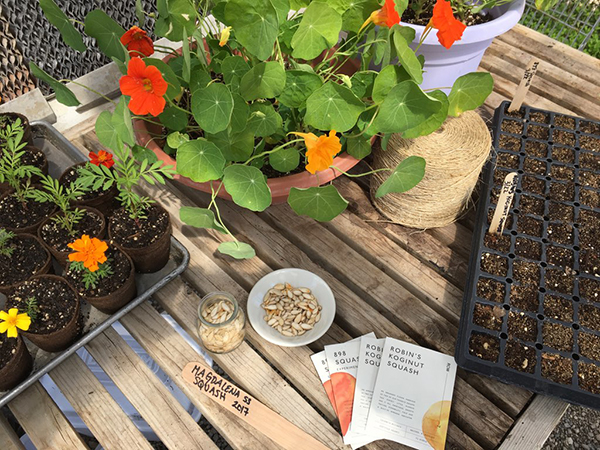

There are many types of native vegetables to explore in this region. One of the few that has resonated recently is squash. These vining cucurbits have an ancient history of growing at the Oasis of Mara, dating back more than 100 years ago to the Serrano and Chemehuevi tribes. At Faultline Farm we pay tribute to this heritage and tradition by growing native and indigenous varieties of squash along side some of the usual suspects. One of the local varieties we like here is the Magdalena. It is considered a Big Cheese squash because it resembles a wheel of cheese when it’s ready to harvest. It’s meat is a little bit denser like a pumpkin but has a texture that can create it’s own threads resembling spaghetti squash. According to Native Seeds/SEARCH, Magdalena is “one of the oldest varieties of cultivated squash” in this area. Another classic we have planted over here is the butternut, which has passed the test of time becoming a staple in professional and home kitchens.
Native Seed/SEARCH is an extensive initiative that all growers have access to in the Southwest. It is a seed bank and historical resource that has organized Native American tribes, farmers, seed savers, and plant breeders to collect a diverse variety of plants from the arid Southwest. Their focus is on creating food security through biodiversity in our crops and selecting for vegetables that are drought tolerant, resilient against pest and disease, and preserve agricultural diversity. The companies efforts are “dedicated to this calling to conserve the rich agro-biodiversity … because of it’s genetic and cultural importance.” They are “working to help communities develop regional seed solutions rooted in traditional seed saving methods to strengthen their food systems.” What this translates to for us on the Farm is making sure that what we plant will grow strong and healthy. All of this contributes to stronger foundation for healthier soil, buffering crop loss, and creating a more diverse ecosystem.
Along side the natives seeds we also like to recognize some of the modern and responsible approaches to seed saving and breeding that is happening in our country. We have recently received some impressive new vegetable seeds from a company called Row 7. Chef Dan Barber of Blue Hill restaurants has been working alongside vegetable breeder Michael Mazourak from Cornell University and seed farmer Matthew Goldfarb to select for vegetables that taste better. Barber says that “One of the biggest lessons I've learned working with breeders is that there’s a huge link between flavor and nutrition, and the craziest part is that no one talks about it. Flavor and aroma compounds – the same ones that make tomatoes and melons mouthwatering – often derive from essential nutrients. It’s nature’s way of telling us what we should be eating.”
One of the vegetables that started it all for the group was squash. Barber challenged Mazourak to develop a better butternut squash, one that is grown for flavor and not for its homogeneity. He accepted the challenge and began experimenting in the field. The company values and respects more traditional plant breeding techniques that veer away from GMO and patents. They “believe that the most flavorful and resilient plant varieties are best created by working with the full genetic heritage of a crop. We utilize time-proven techniques of cross-pollination and selection complemented by modern technology, but we draw a clear line at genetic engineering. It doesn’t advance the changes we seek in the food system, and it’s never produced anything truly delicious.”
We are very excited to be utilizing and experimenting with both forces to bring delicious food to the 29 Palms Inn Restaurant. Growing both the Native Seed Search’s drought and disease tolerant Magdalena coupled with Row 7’s flavorful and nutritious butternut will give us our own research field. Perhaps when the fall rolls around we can start doing our own experiments with seed saving in the field. Come through and visit the farm anytime. We would be happy to have you follow along to see how the past and present can co-habitat on our menus.






